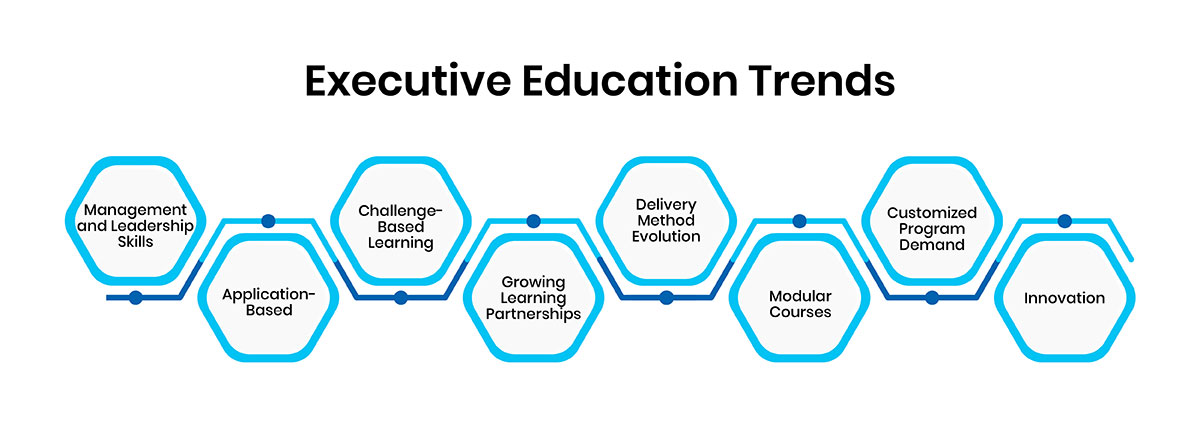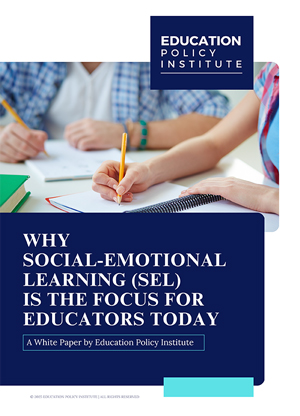It's 2024, and the corporate landscape is evolving at lightning speed. Traditional training methods and higher education programs simply can't keep up. That's why forward-thinking executives are turning to innovative learning to future-proof their workforce and drive organizational success.
In response, executive education is undergoing a significant transformation. The traditional one-size-fits-all approach is making way for high-quality, customized leadership development, adapting to the modern demands of our evolving world. Now, let's take a stroll through the corridors of emerging executive education trends, and understand their importance.
What is Executive Education?
Executive education encompasses specialized educational programs tailored for professionals with several years of work experience, particularly managers and leaders seeking to enhance their skills and maintain market relevance. These programs are also valuable for senior managers and leaders transitioning between industries. Unlike degree programs, executive educational programs are certification-based and focus on upskilling and professional development rather than formal academic credentials.
Understanding the Increasing Importance of Executive Education
The executive education program market is projected to be worth USD 46,322.0 million in 2023 and is forecasted to exceed USD 133,794.3 million by 2033. The adoption of executive education programs is expected to grow at a CAGR of 11.2 percent during the forecast period.
A significant driving force behind the demand for executive education programs is the growing recognition among executives and professionals of the necessity for continuous professional development. Let’s understand—
- Adjusting to Contemporary Requirements: Today's technology-driven corporate landscape underscores the importance of business leaders acquiring essential skills and knowledge. With the inclusion of executive education in higher education, individuals can equip themselves with the necessary tools and expertise to effectively navigate the challenges presented by the constantly evolving business environment.
- Ongoing Learning: Besides staying abreast of technological trends and digital applications, modern executives need to integrate technical proficiency into their daily operations. Executive education plays a pivotal role in enabling individuals to acquire these fresh skills and capabilities, thus contributing to their future accomplishments.
- Broadening Networks: Executive education offers a distinctive opportunity to establish connections with leaders and executives across various industries. This way one can foster collaboration, enabling the formation of new partnerships, innovative alliances, and the emergence of creative concepts.
- Emergence of New Business Models: As industries undergo transformation and new technologies disrupt traditional practices, executives seek higher education programs that can equip them with the necessary skills to navigate these changes effectively and lead their organizations through periods of transformation.
Emerging Executive Education Trends
Let us look at some executive education trends predicted for 2024.

- Management and Leadership Skills: Corporate professionals often manage and lead various teams. Executive education has ensured that this is included in the program. In the present market, leaders must change their management approach. There is a need for empathetic leaders and managers. This will ensure company loyalty among employees.
- Application-Based: As you know, executive education is often geared towards professionals and further ahead of the traditional educational system. Its application-based design ensures relevance in both immediate and future business contexts. Higher education is meant to be applicable in business and not merely theoretical or conceptual. An application-based curriculum has real-world applicability in the immediate and near future and applies to the more distant future.
- Challenge-Based Learning: Another hands-on approach to learning is challenge-based learning, where participants collaborate in (ideally diverse) teams. They address real-world or hypothetical scenarios and develop pragmatic solutions. Challenge-based learning projects are typically complex and require learners to use various skills and knowledge, including critical thinking, problem-solving, communication, creativity, and teamwork (if conducted in teams). Approaches include prototyping, hackathons, what-if scenarios, or impact experiments.
- Growing Learning Partnerships: Organizations are forming partnerships with leading global universities to provide learners with industry-specific knowledge and hands-on experience. These collaborations ensure executive education remains relevant and aligned with the dynamic corporate landscape.
- Delivery Method Evolution: The demand for flexible learning options is driving a shift towards channel-agnostic courses that offer consistent benefits whether pursued online or in-person. This has prompted educational institutions to adopt diverse multimodal learning approaches, blending online and in-person components seamlessly to revolutionize executive education delivery.
- Modular Courses: Post-pandemic, there has been a rise in hybrid learning— a combination of online and offline classes. This format combines in-person interaction with world-class faculty and subject matter experts with the vast knowledge available through online resources. This also helps the working professionals, who are the learners of this course, manage work and learning.
- Customized Program Demand: There is a surge in demand for tailor-made executive programs catering to personalized learning experiences. These customized solutions equip learners with the skills to navigate the evolving corporate landscape effectively. A customized program focuses on personalized journeys, experiential learning, and practical skill application in the workplace.
- Innovation: With growing competition, innovation-based learning has become something that’s sought after. Businesses are always looking to innovate, be it in strategy or processing. To truly benefit from innovation, it is important to cultivate innovative thinking or a culture of innovation. Executive education focuses on developing an innovative culture and helps to understand how this will help managers in their own professional lives. Innovation is the first step toward true professional growth.
Wrapping it Up
As evident, executive education trends have undergone a drastic transformation in their approach. Recent studies project significant growth in the global executive education market, fueled by a heightened focus on continuous professional development. As the nature of work evolves and innovative business models emerge, executives are increasingly seeking educational programs to equip themselves with the necessary skills to navigate these changes and excel in leadership roles.
Latest
Trends blogs
- From Vision to Impact: Closing the Gender Gap in STEM Education
- Automation, Artificial Intelligence, and the Future of Human-Centered Education
- Mid-Career Education in a Changing Labor Market
- The Next Phase of STEM Education: The Role of Artificial Intelligence in Classroom Curricula
Focus blogs
- Research-Driven Education: Strengthening Strategies, Policies, and Classroom Practice
- Professional Certifications for Career Growth: What Students and Young Professionals Need to Know
- Building a High-Impact Center of Excellence: What You Need to Know
- Beyond Graduation: The Importance of Lifelong Learning in Higher Education





